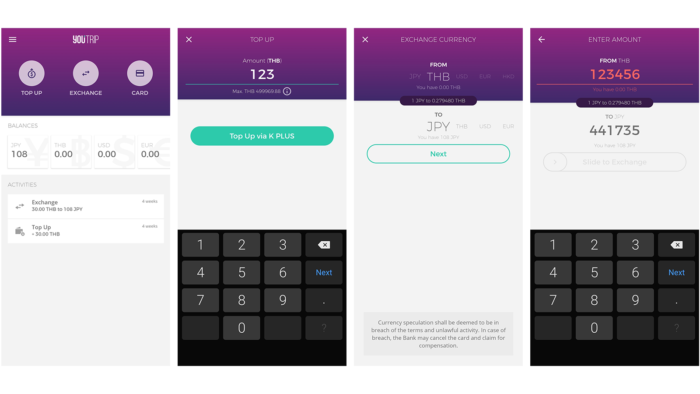For those who have never heard of YouTrip, YouTrip is a challenger bank headquartered in Singapore which has raised 25.5M USD in May 2019. In the same year, in addition to Singapore, it has also started providing service to the Thai market by partnering with the local leading bank, K Bank.
So far, the progress they’ve made seems really impressive… but why then do I say that the company is dead on arrival?
Limited Name
As the name “YouTrip” implies, the app mainly focuses on the needs of travelers:
the first product they offer is a multi-currency digital wallet with a complimentary Mastercard. Users can top-up/load their wallet with their existing credit/debit cards and spend the balance in their wallet through YouTrip issued Mastercards.

The very specific name, “YouTrip”, does indeed make it easier for marketing and promoting to a very niche group of users; however, as time goes on, the limited name will become a liability as the company attempts to expand into adjacent fields. The founder of YouTrip confirms that YouTrip plans to expand its services:
“Right now, we’re incredibly focused on travelers… The plan, further down the line, is to introduce financial products in the future to draw revenue and provide access to services for users”
Caecilia Chu, CEO of YouTrip
For instance, imagine how confusing it is when you see an advertisement saying “YouTrip introduces cryptocurrency trading on the app”? Which is why most of the challenger banks in the world either make their own names (eg N26 from Germany and Varo from US) or choose names that are abstract in their original meanings (eg Chime from US and Curve from UK).
As a side note, the example of cryptocurrency trading feature isn’t that far-fetch since the existing challenger bank Revolut from UK added that feature since December 2017.
Limited Revenue Sources
Besides the limited name, YouTrip also suffers from limited revenue sources.
At the time of writing, there are three main revenue sources for YouTrip:
- Interchange fee:
the fee charged from the store owner when the YouTrip card holders swipe their cards in store - Margin on exchange rate:
the difference between the exchange rate YouTrip gives to the users and the rate they get from their card issuer - Annual Fee:
an annual subscription fee for YouTrip services
The problem for these three revenue sources is that the first one is set by the card issuers or the card brands they work with (if they don’t have enough bargaining power, they won’t get any money from this) whereas the latter two are capped due to competition.
On the competition – in Singapore, besides the traditional banks like CitiBank and OCBC, there are other well-funded fintech players like Revolut and TransferWise providing similar products that solve the same need and both of them have more income streams than YouTrip due to years of expansion.
What makes the situation worse is that YouTrip isn’t a bank: under the hood, YouTrip works with a prepaid card issuer (EZ-Link in Singapore and K Bank in Thailand) to offer their service, which limits the category of the financial products they can offer on their app. Before YouTrip finds a sponsor bank, a bank that is willing to sponsor/lend their banking charter to another company, they can’t provide the following services by themselves to their users:
- Insured checking/saving account with insurance provided by the government
- Credit card
- Unsecured loans
- Robo-advising
As an alternative way to bypass some of these restrictions, YouTrip could integrate with other fintech companies that hold the required licenses to provide the above features, but so could their fintech competitors like Revolut and TransferWise.
Due to the restrictions from its name and the non-bank status, I would expect their near future revenue sources will be more related to the travel industry than in the financial sector. The potential travel-related features they could provide include:
- Travel insurance
- Hotel booking
- Airplane tickets booking
- Car rental
- Tickets booking
However, all of the above services are outside of YouTrip’s core competencies. This means that instead of building these services from scratch, they will need to partner with existing aggregators such as Expedia, Klook or Booking.com and monetize via commission through successful transactions from their platform. Overall, I doubt the commissions coming from these features will be meaningful enough to help them achieve profitability.
What’s Next?
As if the current condition isn’t bad enough, the competitive landscape in Southeast Asia will become dramatically worse for YouTrip in 2020:
- In Singapore, where their home market resides, the Singaporean governments will issue as many as 5 digital banking licenses for non-bank firms in the middle of 2020.
- In Thailand, in the beginning of 2020, the Thai government has started to build the foundations for digital banking licenses without giving a detailed timeline.
- In Malaysia, the central bank of Malaysia plans to offer up to 5 digital banking licenses before the end of 2020.
And partially, if not all, because of the debacle of WeWork’s failed IPO, public as well as private investors are scared of money-losing businesses and businesses with bad unit economics.
If YouTrip can’t prove that they can:
- acquire users at a much lower cost than their competitors do (ie lower CAC), or
- generate more revenue per user than their competitors do (ie higher LTV)
before the launch of digital banks in the markets they operate in, I believe they will have a hard time raising a new round of investment under the current fundraising and competitive environment.
Another way for YouTrip to ‘survive’ in a situation like this is to acquire as many customers as possible and then sell itself to any of the new digital banks or existing banks.
The clock is ticking. Run, YouTrip, run!
